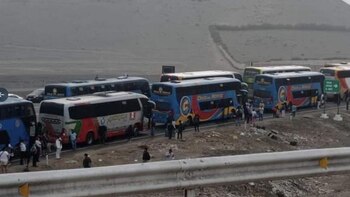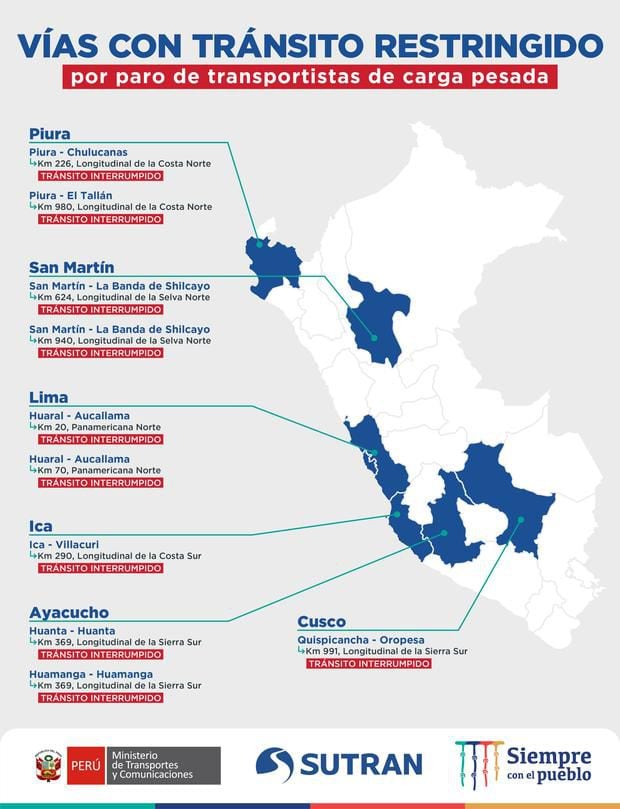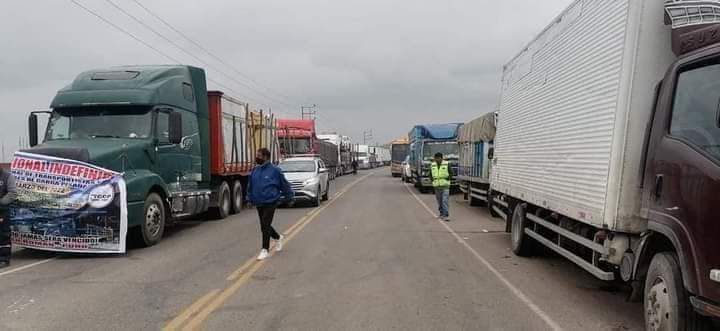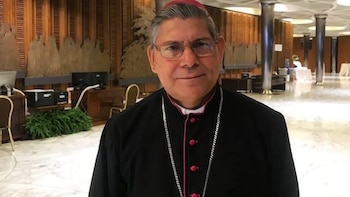
The National Guild of Freight Carriers (GNTC) announced a national strike starting this Monday, March 28, after the excessive increase in fuel. Workers in this area say that this increase in the price of gasoline makes it impossible to transport cargo nationwide.
The president of GNTC, Héctor Velásquez, said that due to this increase in fuels, the cost of freight that they are now charging “is no longer enough for us to continue operating.”
This national strike will greatly affect Peru's main food centers and would cause prices to rise in basic necessities such as vegetables, fruits, rice and sugar, whose price rose to 250 soles per sack.
From an early age, carriers blocked roads, burned tires and prevented the passage of hundreds of interprovincial buses, combis, cars and private vans that form long queues on the country's main roads.
Transport unions demand that the government stabilize fuel prices and the crisis they are currently experiencing due to the lack of attention from the authorities.
RESTRICTED ROUTES
The roads connecting Puno, Ica, Arequipa, Piura, Ayacucho, Cusco and Arequipa have been reported with restrictions due to carrier protests.
One of the roads affected is the Los Libertadores highway, in Ayacucho, where Canal N reported burning tires and obstructing traffic with stones. This situation affects passengers on dozens of interprovincial buses that cover the Lima-Huamanga route.
A section of a highway in Huaral heading north was also blocked for several hours, but the PNP managed to reach an agreement with the Protestants and the vehicles managed to move forward.

The Sutran urged the population to take their precautions. “Traffic remains restricted in different parts of the country, due to the stoppage of heavy cargo carriers. Users and operators of land terminals are urged to reschedule their trips,” said the entity.
Lima: Height km 20 (both lanes of the Pasamayo coil); height of km 70 North Pan-American Highway (both lanes).
Cusco: Sector Angostura, exit to the province of Quispicanchis, Tica Tica sector, towards the exit to Anta, section of the highway Ccoypa - Paccarectambo, kilometers 913 and 924 of the Cusco - Abancay road; via Cusco - Urcos, Oropeza district; via Cusco - Ocongate; via Cusco - Urcos town center Huarcapay; Cusco — Ccorca highway; via Cusco — Urcos Manantiales sector — Andahuaylilla; Tongobamba sector, height of the Management Circuit; Pisac — San Salvador road
Ucayali: Km 5 and 6 Fernando Belaunde Terry road
Ica: Km 272 and 290 of the Panamerican South
Puno: Height of the Peruvian Universidad Unión; height of the former asphalt plant; Juliaca district San Román province, exit to Arequipa; Lampa province Santa Lucia district; Juliaca - Arequipa route; km 239 via Santa Lucía - Cabanillas
Junín: Marcavalle (Sapallanga - Pucara); height of the San Lorenzo oval
Arequipa: Km 4.5 of the Uchumayo - Ovalo Volvo - Cerro Colorado variant; entrance road to the town of Callalli; km 3.5 height of the Acomare market.
Ayacucho: Ramon Castilla Avenue - New Bridge.
Piura: Piura - Chiclayo road, height of the Bayovar toll; alt. km 975 San Antonio farmhouse; Piura - Chulucanas road; Las Lomas bridge; entrance to Chalaco-Morropon; Piura - Sullana road; km 13 La Golondrina farmhouse.
Apurimac: Pan-American Highway with a detour to the city of Grau.

MTC MINIMIZES STOPPAGE
The Ministry of Transport and Communications (MTC) issued a statement in which it regretted and rejected that “a small sector of freight carriers express their protests violently, blocking the free movement of people and vehicles, ignoring the progress in the dialogue that the sector has with representatives of the formal carriers”.
The entity reiterated that the sector, in coordination with the Ministries of Economy and Finance and Energy and Mines, is working on the bill that will regulate the entry of international transport vehicles on border roads eliminating unfair competition.
“It should be noted that the government will make public the measures that the Executive has taken to stabilize fuel prices, with special emphasis on diesel and LPG prices, both for domestic use and for vehicle use,” the statement concludes.

POLICE INTERVENE
Likewise, the Peruvian National Police (PNP) reported that, through its operational units, it is carrying out preventive work to clear, maintain and restore roads, prioritizing dialogue with carriers in order to avoid social costs.
These actions are carried out in order to allow vehicles to pass, prioritizing emergencies (ambulances), food loading, among others, that require to reach their final destination without problems, all within a peaceful framework that allows free vehicular and pedestrian movement.
In this regard, they urge the population to remain calm and avoid crossing the blocked roads, as well as to support the work carried out by the members of the PNP.
KEEP READING
Últimas Noticias
Debanhi Escobar: they secured the motel where she was found lifeless in a cistern

The oldest person in the world died at the age of 119

Macabre find in CDMX: they left a body bagged and tied in a taxi
The eagles of America will face Manchester City in a duel of legends. Here are the details

Why is it good to bring dogs out to know the world when they are puppies




